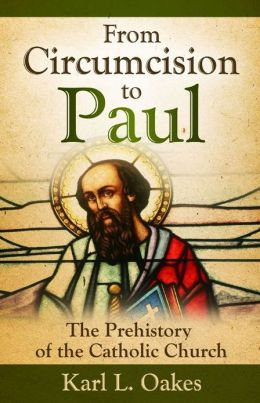Day 647 of 1000
 A few weeks ago, my friend Eric told me about a book written by Karl Oakes. Karl is a mutual friend of ours. The book he wrote is titled From Circumcision to Paul: The Prehistory of the Catholic Church. I just downloaded it to my Samsung S3 from Amazon and look forward to reading it. The preface to the book describes the premise quite nicely:
A few weeks ago, my friend Eric told me about a book written by Karl Oakes. Karl is a mutual friend of ours. The book he wrote is titled From Circumcision to Paul: The Prehistory of the Catholic Church. I just downloaded it to my Samsung S3 from Amazon and look forward to reading it. The preface to the book describes the premise quite nicely:
Students of early church history are confronted with an almost insurmountable problem. There are no more than a handful of authentic Christian documents from between the close of the New Testament around A.D. 70 and the emergence of the Catholic Church in the middle of the second century. The literary evidence is so sparse that it is almost impossible to chart the course of Christianity in the intervening years. Nevertheless, an indisputable fact emerges from a comparison of the writings of teh apostles with those of early Catholicism: the two do not match. The ministry has changed from the apostolic pattern, the theology is distinctly unPauline, a liturgy has developed, and the rites of baptism and the breaking of bread are viewed and observed differently; even the Scriptures do not correspond. It is like trying to fit a square peg into a round hole.
There is a reason for the poor fit. The two bodies of literature are expressions of different Christian traditions. The Bible was written by the eye-witnesses of the Lord and their immediate followers; the apologies and letters of the Fathers are from the church which would later be called universal. The differences cannot be explained by claiming the first century church was yet primitive while the second century literature reflects a more mature state of development. The chasm is simply too great.
If the writings of early Catholicism do not represent the church of Peter and Paul, then who were Papias, Polycarp, and the other presbyters of the second century? The question takes us back into the New Testament. The most complex and controversial issue confronting the apostles concerned the Law of Moses. The disciples followed the example and teachings of Jesus in all things, but were they also expected to follow him in his observance of Torah? The apostles and elders convened at Jerusalem and unanimously agreed that Gentile Christians were not bound by the Law. However, some believeing Pharisees refused to accept the decision and mounted a campaign to convince the saints in the outlying churches. The circumcising teachers who opposed Paul formed a cohesive movement, but when the New Testament finally closes, they utterly vanish from the pages of history.
If they had continued and evolved, what would such a church look like? It would have many features of rabbinical Judaism wrapped in a Christian package. They would have retained the more important Jewish festivals, perhaps Passover. Their worship and liturgical practices would derive from synagogal precedents, and their common prayer would be patterned after the Eighteen Benedictions. We would expect to find church documents without a trace of Pauline influence and a history of the apostolic period without Paul. We would see fasting regulations, rules on marital abstinence, Hebrew baptismal customs, and a legalistic theology. It would, in short, resemble the Catholic Church as it emerged into view in the middle of the second century.
History is written by the winners.
–George OrwellHistory is written by the victors, but eventually the truth comes out.
–Former South Vietnamese Ambassador to the US
I have read a lot of Ancient Near East history, but my reading has been relegated mostly to academic works on the history of the resurrection of Christ by authors like NT Wright, JP Moreland, Ben Witherington III, and others. I am an avid fan of Rodney Stark, a sociologist who writes about the influence of Christianity, the Crusades, and the growth of the church over the centuries. I have read about the Waldensians, the Cathars, and other non-Catholic Christian movements that tried to closely follow the bibile. This will be a departure from all that. I hope to learn something and will report back as I work my way through the book.
